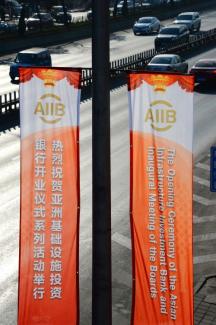AIIB
Lacking standards

Considering its economic strength, China is underrepresented in the established international financial institutions (IFIs), where the tone is set by the United States, EU member countries and Japan. The creation of the AIIB was a response to that – as well as an attempt to boost Beijing’s international influence.
The AIIB’s mission is to promote social and economic development, especially in Asia. It grants and facilitates long-term loans that would not be available without it. The bank seeks to strengthen regional cooperation, supporting public as well as private investments.
The AIIB’s founding members include European nations. Germany is the biggest European shareholder and holds 4.1 % of the voting rights. Therefore, environmental and human-rights organisations believe that Germany has a special responsibility.
Urgewald is one such organisation. In its view, the AIIB needs to adopt and observe appropriate social and environmental standards, but it is failing on both fronts. In the critics’ eyes, one example is a Indonesian slum upgrading project in the context of which the human rights of women and indigenous people were violated. The project is co-financed by the AIIB and the World Bank.
For a long time, environmental and human-rights organisations have been complaining about established IFIs only applying inadequate environmental and social standards. Now they accuse the AIIB of failing to meet even those standards.
The AIIB cooperates with established IFIs on many projects. Nevertheless, it is their competitor, says Arntraud Hartmann, a member of a standards-monitoring committee at the Asian Development Bank (ADB). She warns that in the long run the desire to attract clients will result in the lowering of standards at all multilateral banks.
In regard to energy projects, for example, the AIIB’s guidelines are less strict than those of the World Bank. The AIIB rules out neither coal projects nor nuclear power, but AIIB President Jin Liqun says the bank’s work is “lean, clean and green”.
According to a Hawaiian critic, the AIIB pays little attention in its day-to-day operations to the grand principles it claims to be committed to. Her point is that the bank lacks transparency and reliable control mechanisms.
This view was shared by experts attending an urgewald meeting to discuss the AIIB in Berlin last month. Many demanded that AIIB involve both its shareholders and civil society in project planning and evaluation processes. A first step – it was suggested – would be to provide earlier and fuller information on projects and complaint mechanisms.
Questionable cooperation partner
Members of the German Bundestag, however, hope to have a positive influence on the AIIB.
Social Democrat Manfred Zöllmer sees German participation as an opportunity to exert pressure on Beijing to adopt appropriate standards in the future. However, he admits that it will take time. “The AIIB needs to observe standards that are not the norm in China and that the Chinese are not familiar with,” says Zöllmer, who is a member of the Bundestag’s finance committee.
How much influence Germany will really have on the environmental and human-rights situation in the target regions is debatable, says Thomas Gambke, who belongs to the Green party. He argues that the AIIB’s European shareholders must cooperate to gain more influence.
Philip Murman of the Christian Democrats says the AIIB might facilitate investments beyond what the Asian Development Bank is doing. In his eyes, for example, there is a great need to invest in rural health care and education.
“The AIIB will try to improve matters,” promises AIIB press spokesman Yuanjiang Sun, pointing out that the AIIB is still in its infancy and plans to work on standards and strategies.







